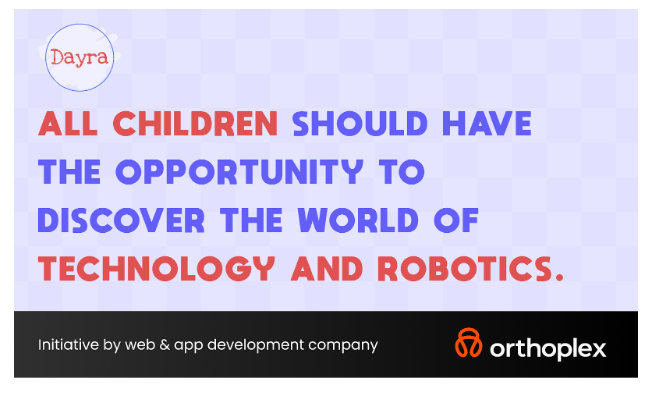The World’s First Free Online Store Fuels Children’s Development with Tech Toys
With just a few clicks, no credit cards, and no delivery fees, parents can now get their kids brand-new robots and tech toys from the world’s first free online store.
In March 2024, Orthoplex Solutions founders launched a free online store, dayra.ca, out of their deep belief in the crucial role of playtime for children and the right of every child to get introduced to the tech world at a young age.
It is often said that play is a kid’s version of work. Playtime is how kids figure out the world, themselves, and even each other. It’s as crucial for their development as drinking water, eating fruit, or catching some Z’s.
Now, when it comes to play, there’s no rulebook! It could be anything from molding clay into wild creatures, playing with free robots and vehicles from Dayra (the world’s first free online store), or even exploring the backyard with a magnifying glass. Every kid’s playtime is like a unique fingerprint – it’s different every day and for every child. Some days, they’ll team up with friends; other times, they’re off on solo adventures. Sometimes, they’ll chatter away, and other times, they’re lost in their own thoughts.
Kids don’t need exhausting activities or even expensive toys to let their imaginations run wild. Because no matter the form it takes, they’re soaking up knowledge and expanding their horizons while they’re having fun. Here are five reasons why play (whether unstructured or not) is a big deal for a child’s development:
1. Play sparks imagination and fuels creativity.
During playtime, children stretch the limits of their imaginations. They invent make-believe scenarios and immerse themselves into imaginary worlds where they can be anyone and do anything they put their hearts and minds into. In these moments, kids explore various solutions and scenarios, boosting their confidence. They’re the masters of their universe, setting and adjusting rules as they see fit – a valuable skill set that helps them navigate life’s twists and turns and form meaningful connections with others.
Symbolic play is another crucial aspect of childhood development that helps with future learning and problem-solving skills. Plus, it’s a breeding ground for creativity, a trait that can lead to success. Symbolic play is when kids get super imaginative and use items to represent or symbolize something else during playtime. A blanket or towel may become their superhero cape, allowing them to fly through the air to save the day, or a magnifying glass makes them become a detective who can solve mysteries and uncover clues. The possibilities are limitless with symbolic play, offering endless opportunities for learning, growth, and fun!
2. Play nurtures cognitive development.
Unstructured play is when children take the lead in their own playtime, free from adult-directed schedules or activities. Engaging in unstructured play is crucial for the positive development of their brain. Moreover, it plays a significant role in strengthening the brain’s prefrontal cortex. This region influences a child’s learning process, problem-solving abilities, and understanding of their surroundings.
3. Play offers emotional and behavioral advantages.
While play helps build confidence and self-esteem, it also serves as a crucial tool for children to understand and process a wide range of emotions (both positive and negative). For example, losing a game teaches children to navigate feelings of sadness, anger, and disappointment. Through play, they learn to confront challenging situations and express their emotions.
Another powerful example is when children use toys, like dolls, to work through complex emotions surrounding difficult experiences, such as a parent’s illness. By acting out scenarios with their toys, children can safely express feelings of rage, fear, or helplessness in a comfortable and natural way.
On the other hand, group play provides an outlet for children to release excess energy in a safe and controlled environment. It’s like a pressure valve, letting them blow off steam and deal with any pent-up energy or aggression. That’s why it’s so important to provide them with a variety of toys, from robots and vehicles to magnetic building blocks or art supplies, as well as opportunities for both unstructured and structured play. These will ensure that kids have the tools they need to learn how to handle and tackle their emotions head-on.
4. Engaging in play enhances language and literacy skills.
Kids come into this world already hardwired to soak up language like little sponges. Watching those cute little ones pick up new words when adults speak or describe what’s happening around them is amazing. Catchy songs and poems are like magic, helping them connect syllables to beats and develop their listening skills.
But it’s not just about words; kids also learn about communication through play and interactions. Whether having a pretend tea party, playing dress-up, or mimicking household chores and other professions, they’re learning the power of communication.
Even as kids age and enter school, playing with them remains just as valuable. Research says kids are more focused and ready to tackle their schoolwork after a good old-fashioned play break. Playtime sparks curiosity; a curious mind is like a sponge, ready to soak up all that learning goodness.
5. Independence flourishes through play.
You know how kids often feel like they’re constantly being told what to do, when to do it, and where to go? It’s like their days are just one big list of instructions. But when they immerse themselves into playtime, things flip around. Suddenly, they’re calling the shots, setting the rules, and taking charge. During play, they can shine as leaders (if they want to) while we adults take a step back and follow their lead.
Sure, playing with friends is awesome, but learning to entertain themselves is just as important. When kids get comfy with playing solo, they start developing a stronger sense of independence. Watching a group play from a distance also helps them pick up on all those subtle social cues that help them navigate their way through future group adventures.
How Dayra’s Free Toy Library Can Fuel A Child’s Development
The reality is not every kid has the opportunities or access to toys. For some families, buying toys isn’t even on the radar. They’re focused on putting food on the table and covering the basics to get by. It’s a tough reality for less fortunate families. That’s where Dayra (the first free online store for underprivileged children in Canada and the USA) comes in! They’re like superheroes, teaming up with food banks to ensure every child can explore their creativity and discover the world of technology and robotics.
Now, the idea behind Dayra is truly heartwarming: it all started when three siblings, founders of Orthoplex Solutions, were deeply inspired by their childhood experiences of giving back and making a meaningful difference. As kids, they’d accompany their mom to orphanages, spreading joy and creating wonderful memories with the children there. Those moments stayed with them, fueling their passion to touch more people’s lives. Fast forward to today, and bam! Dayra is here to spread love and change lives by providing free gifts for kids.
With innovative social initiatives like this, Dayra is opening doors to new worlds of learning and exploration for underprivileged kids. So, here’s the deal: when you sponsor Dayra, you’re not just supporting a good cause. You’re giving hope and inspiration to children who deserve it most.
Ready to join the cause? Visit their website to learn about the impact you can make and how to get involved today!



